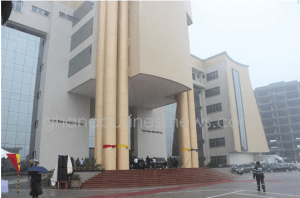Courts deserted as JUSAG begins strike

Law courts in Accra were deserted on Friday April 1, as the Judicial Service Workers Association of Ghana (JUSAG) began a strike over government’s failure to implement their consolidated salaries and emoluments.
The doors to the new court complex which houses many commercial, land, general jurisdiction and other courts were closed to the public and the few visitors unaware of the strike action.
The Circuit Courts and High Courts in Accra were also deserted and the only staff present would not render any services or respond to the simplest of enquiries.
The President of JUSAG Mr Alex Nartey, said at a press conference on March 31, that the withdrawal of services would continue until all their demands were met.
He however urged security personnel of the service to remain at post in order to protect state property.
The strike which could pose a test to government’s resolve to avoid the recurrent election year budget overruns, follows an ultimatum by JUSAG on March 2, 2016 demanding the full implementation of their new salaries, which they said has not been carried out since being approved and presented to government by the Judicial Council in June 2015.
Mr Alex Nartey said that JUSAG had not received any official correspondence from the government.
“The National Labour Commission wrote to the Ministry of Employment and Labour Relations requesting a response within seven days of our letter. If there has been any correspondence, we are yet to know.”
Instead, the JUSAG President said management drew the association’s attention to a letter from government on March 16, 2016, requesting the establishment of a committee to review the new salaries that had been approved by the Judicial Council.
According to Mr Nartey, government’s response to the letter which the association sees as a delay tactic, did not only flout the tenets of the 1992 Constitution, but was a disdain to the Judicial Council and an affront to administrative procedures.
JUSAG, Mr Nartey said, was not opposed to government seeking for clarification on approved documents.
“However, we cannot fathom the imposition of a committee requesting us (JUSAG) to defend an approved document of the Judicial Council,” he added.
Mr Nartey said if there was any review of salaries to be done by the government it should be done in consultation with the Judicial Council and not a body outside the Council.
He said to the best of the association’s knowledge, the Judicial Council had fairly and constitutionally considered JUSAG’s position and grievances.
In 2012, the Judicial Council considered the analogous grades of officers of the Judicial Service as compared to some members of the lower bench and produced a document recommending the consolidation of all salaries and allowances and detailing the conditions of service for senior and junior employees.
By Emmanuel Odonkor with additional files from GNA
